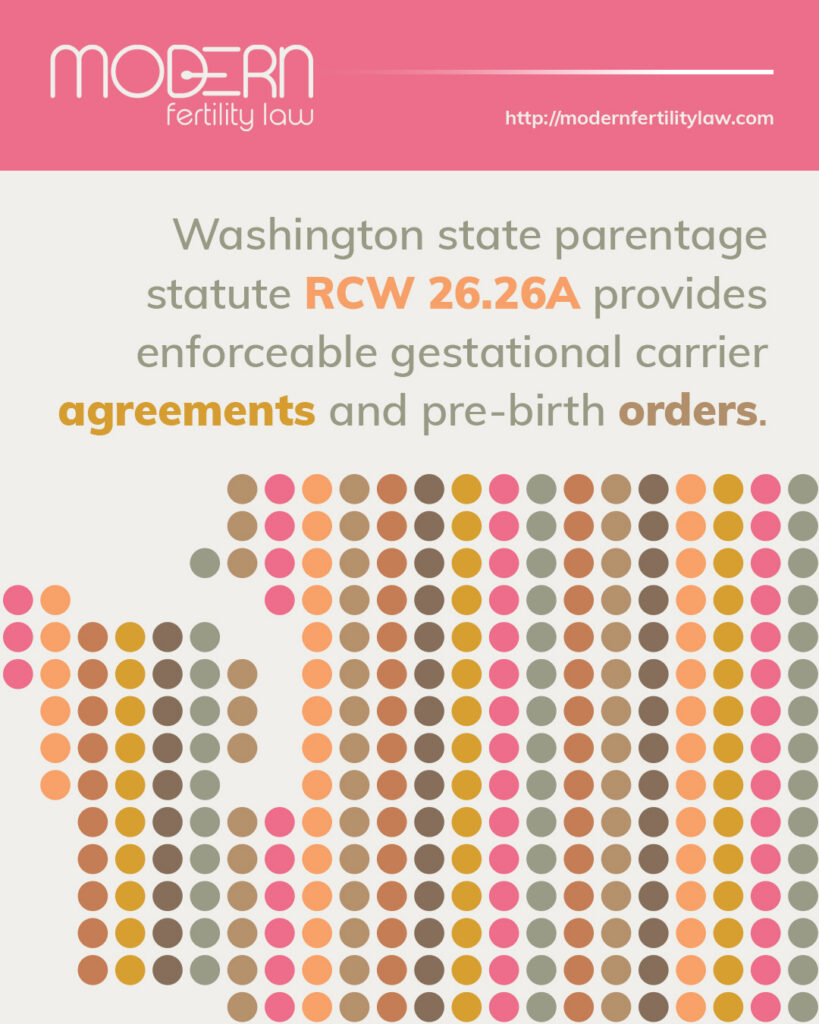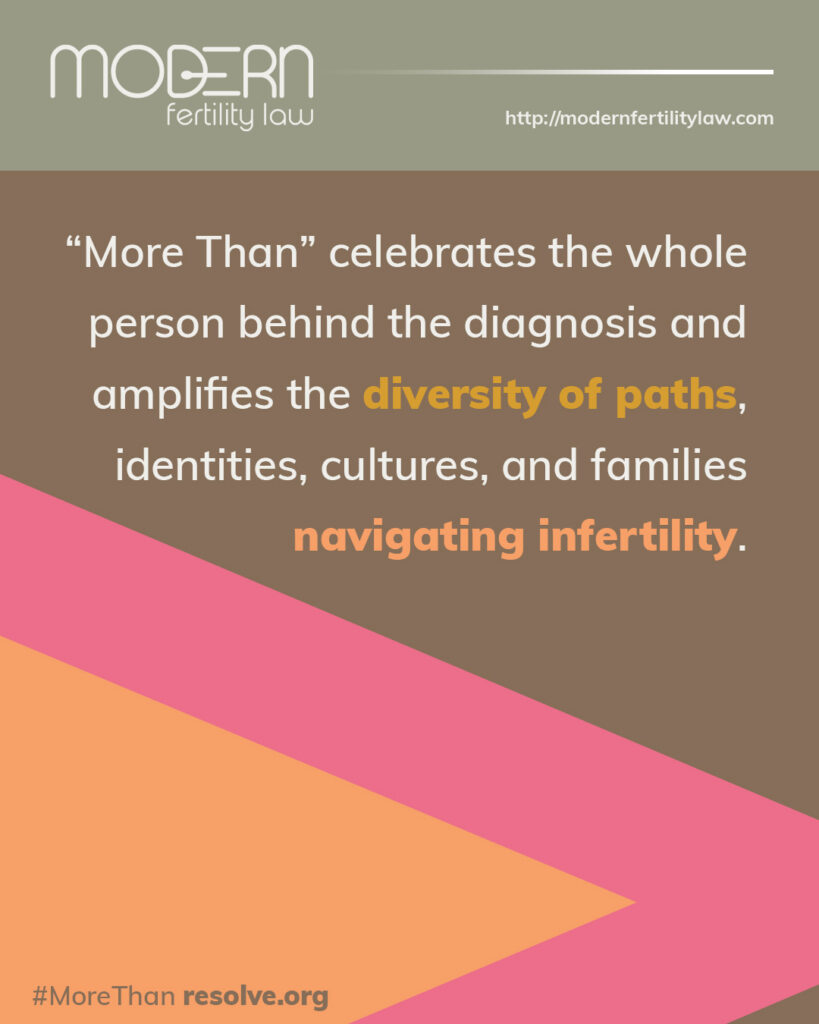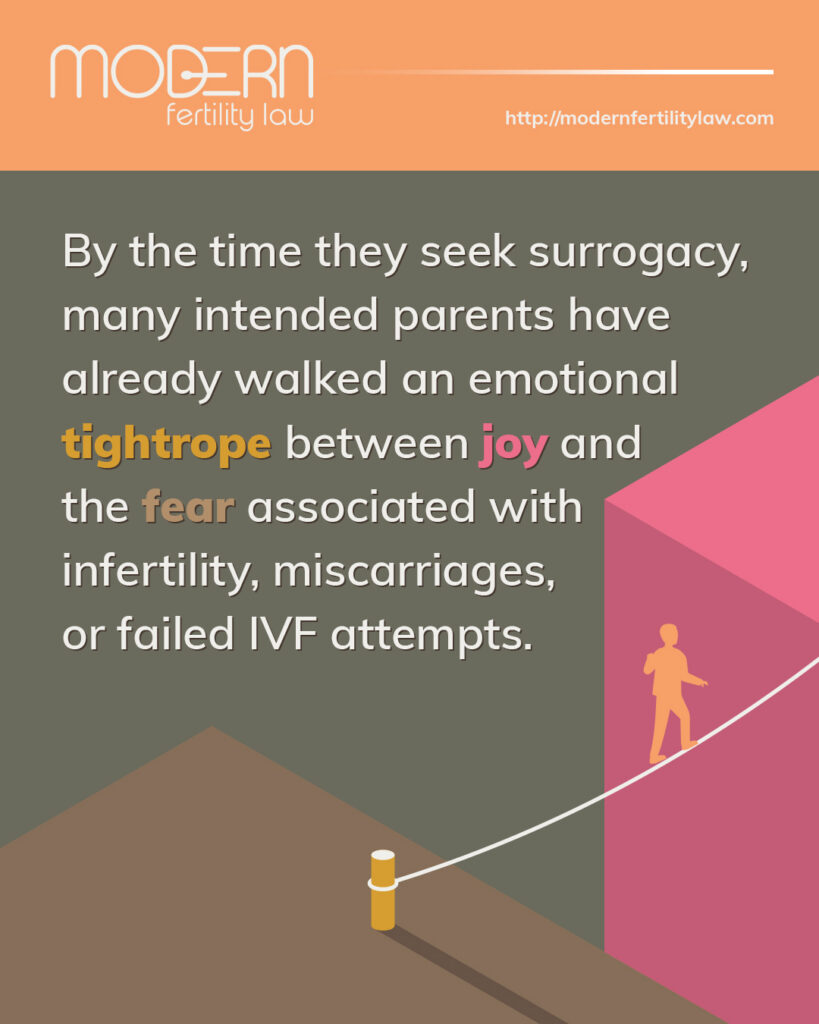In recent years, Washington has updated its parentage laws to modernize and clarify how families are formed through assisted reproduction and surrogacy. Central to this effort is RCW 26.26A, the state’s Uniform Parentage Act (UPA), which explicitly authorizes enforceable gestational carrier agreements and permits judicial parentage orders, including pre-birth orders, under defined legal conditions. This statutory framework was enacted to provide predictability for intended parents, gestational carriers, and children alike, ensuring legal parentage can be determined efficiently and fairly in surrogacy arrangements.

1. Background: The Uniform Parentage Act and Surrogacy Law Reform
Before the adoption of RCW 26.26A in 2019, Washington lacked a clear statutory scheme governing surrogacy and the determination of parentage in assisted reproduction cases. The prior law, RCW 26.26, provided limited guidance around paternity and parenthood generally but did not comprehensively address modern reproductive technologies or gestational carrier arrangements.
The Uniform Parentage Act (Chapter 26.26A RCW), effective January 1, 2019, significantly expanded and clarified parentage law. Among its many sections, RCW 26.26A.700-785 provides a detailed regime governing surrogacy agreements, including gestational surrogacy, enabling those agreements to be enforceable contracts when specific statutory requirements are met. The statute also sets forth mechanisms for establishing legal parentage through pre-birth and post-birth orders in court.
2. Defining Gestational Surrogacy and the Statutory Framework
Under RCW 26.26A, a surrogacy agreement is broadly defined as a contract in which a person agrees to become pregnant and deliver a child for another person or couple, often referred to as the intended parents. The statute distinguishes gestational surrogacy from genetic (traditional) surrogacy: in gestational surrogacy, the surrogate carries an embryo with no genetic link to her; in genetic surrogacy, the surrogate is also the genetic contributor. Certain provisions of RCW 26.26A explicitly govern these separate arrangements.
Gestational surrogacy is the most common model used in modern assisted reproduction because it clearly separates biological and legal parentage—issues that the statute directly addresses by placing intended parents on firm legal footing.
3. Enforceability of Gestational Carrier Agreements
A. Statutory Recognition of Enforceability
One of the core components of RCW 26.26A is its recognition that gestational carrier agreements can be enforceable if they comply with specified statutory requirements. RCW 26.26A.755 states in clear terms:
“A gestational surrogacy agreement that complies with RCW 26.26A.705, 26.26A.710, and 26.26A.715 is enforceable.”
This provision signals a significant shift from older approaches that treated such agreements as unenforceable or subject to judicial skepticism. Under the current law, enforceability is tied not to general contract principles but to compliance with statutory preconditions ensuring fairness, voluntariness, and protection of all parties’ rights.
B. Statutory Requirements for Enforceability
To qualify for statutory enforceability, a gestational carrier agreement must meet all of the following:
- Eligibility under RCW 26.26A.705 (including minimum age and ability to consent).
- Procedural requirements under RCW 26.26A.710 (timing and formal execution procedures).
- Content standards under RCW 26.26A.715 (substantive clause requirements).
These requirements are designed to uphold both parties’ autonomy and the child’s welfare.
RCW 26.26A.705 & RCW 26.26A.710
Although relatively technical, these sections ensure that all parties:
- are of legal age and capacity,
- enter into the agreement voluntarily and with full understanding,
- execute the agreement before any medical procedures,
- have independent legal counsel, and
- have fully disclosed and documented the terms.
For example, the statute requires independent legal representation for the surrogate and intended parents, with each counsel identified in the agreement, and that the surrogate be advised of her rights and responsibilities.
RCW 26.26A.715: Content Requirements
RCW 26.26A.715 specifies substantive elements that must be included in a valid surrogacy contract. These include:
- an agreement by the surrogate to undergo assisted reproduction procedures,
- provisions about the surrogate’s and intended parents’ understanding that parentage will not vest in the surrogate,
- detailed disclosures about medical, financial, and insurance arrangements,
- confirmation that the surrogate retains control over her health decisions during pregnancy, and
- information about rights to terminate the agreement.
This section is fundamental: an agreement that fails these content requirements is not statutorily enforceable, though courts may still adjudicate rights consistent with the parties’ intent.
C. Remedies and Limits on Enforcement
If an enforceable gestational carrier agreement is breached, the statute allows traditional remedies at law or equity, such as damages, except in certain situations. For instance, specific performance is generally not available for breaches relating to the surrogate’s bodily autonomy. However, if a court has determined parentage and prevented intended parents from exercising parental rights at birth due to a breach, specific performance may be available in that narrow context.
4. Parentage: Operation of Law and Order of Parentage
A. Parentage by Operation of Law
RCW 26.26A.740 addresses parentage in gestational surrogacy cases. It provides that:
“On birth of a child conceived by assisted reproduction under a gestational surrogacy agreement, each intended parent is, by operation of law, a parent of the child…”
This means that intended parents become legal parents at birth without any additional adoption or administrative steps if the gestational surrogacy agreement is compliant. Likewise, the surrogate and her spouse or former spouse are not considered parents, reinforcing that legal parentage shifts to the intended parents at birth.
There are exceptions, particularly if the surrogate is genetically related to the child, in which case genetic testing is ordered, and parentage is determined under the standard parentage provisions.
B. Special Rules for Deceased Intended Parents
RCW 26.26A.745 ensures that an intended parent who dies after gamete or embryo transfer is still treated as a parent unless the agreement explicitly provides otherwise, under certain timing conditions. This protects intended parents’ rights and families from unintended consequences of death during the reproductive process.
5. Pre-Birth Orders: Early Determination of Parentage
One of the most practical innovations in Washington’s law is the availability of pre-birth parentage orders for gestational surrogacy.
A. Statutory Authority for Pre-Birth Orders
RCW 26.26A.750 permits a party to a gestational surrogacy agreement to initiate a superior court proceeding before, on, or after birth to obtain an order declaring that each intended parent is a parent of the child. The court may include:
- Vesting parental rights and duties in intended parents immediately at birth,
- Declaring the surrogate is not a parent,
- Ordering the state registrar of vital statistics to list the intended parents on the birth record, and
- Protecting the privacy of the child and parties, among other relief.
Importantly, the court can issue this order before birth, though enforcement is stayed until after birth. This allows intended parents to secure legal parentage in advance of delivery, reducing uncertainty and administrative challenges at the hospital and afterward.
B. Practical Significance of Pre-Birth Orders
Pre-birth orders are particularly valuable because they:
- Provide certainty that intended parents will be recognized at birth,
- Allow intended parents to be listed on the child’s birth certificate without a separate post-birth parentage proceeding,
- Avoid delays or disputes at hospitals or with government agencies, and
- Are available regardless of marital status, sexual orientation, or whether one or both intended parents have a genetic link to the child.
Washington’s law is considered surrogacy-friendly, emphasizing inclusion of diverse family types under its pre-birth order provisions.
C. Distinction From Genetic Surrogacy Parentage Orders
Notably, pre-birth orders are not routinely available in genetic (traditional) surrogacy agreements. Genetic surrogate agreements require validation by the court before assisted reproduction, and post-birth proceedings are used instead.
6. Administrative and Practical Considerations
A. Birth Records and Registrar Directives
Under RCW 26.26A.750, a superior court order can direct the state registrar of vital statistics to list the intended parents on the birth certificate. This avoids the administrative hurdle some states impose when intended parents are not recognized on initial birth records.
B. Privacy and Court Records
The statute also allows courts to limit inspection of records to protect the privacy interests of the child and parties, a feature that acknowledges the sensitive nature of assisted reproduction and surrogacy arrangements.
C. Application and Jurisdiction
Court proceedings under RCW 26.26A occur in Washington’s superior courts, which have exclusive jurisdiction over parentage actions. The law applies regardless of the child’s birth location if the court has proper jurisdiction, anchoring the state law’s reach beyond strict geographic limits.
7. Conclusion
Washington’s Uniform Parentage Act (RCW 26.26A) provides a robust legal framework for the use of gestational carrier agreements and pre-birth parentage orders, reflecting modern family building realities. By specifying enforceability standards for gestational surrogacy contracts and allowing intended parents to obtain pre-birth judicial recognition of their parental status, the statute promotes legal certainty, inclusivity, and child welfare.
The statutory scheme requires careful adherence to requirements governing the execution, content, and enforcement of agreements and outlines clear judicial procedures for recognizing intended parents. These elements work together to ensure that surrogacy arrangements are not only legally enforceable but that the resulting parent-child relationships are secure and recognized both socially and legally at the earliest possible stage.
For intended parents, surrogates, and practitioners, RCW 26.26A represents a thoughtful and comprehensive approach to integrating assisted reproduction into the state’s parentage law—balancing contractual enforceability with protections for all involved.
Modern Fertility Law has made this content available to the general public for informational purposes only. The information on this site is not intended to convey legal opinions or legal advice. For further information on medical issues, please consult the American Society for Reproductive Medicine.




